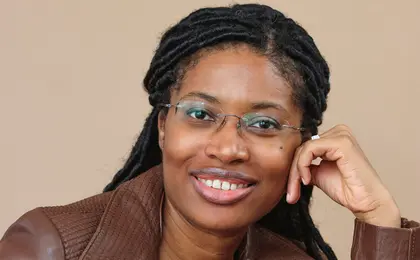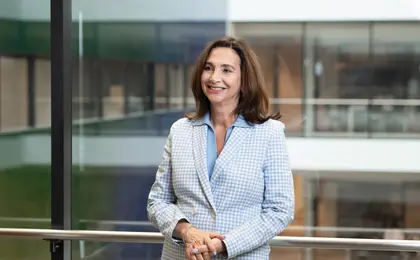
Funmi Akinlawon Haastrup ’03
MBA
Co-founder and Principal, Equity Journey Partners
It was during a course at the Yale School of Management that Funmi Akinlawon Haastrup ’03 first realized she could craft a career that combined her interest in business with her commitment to youth issues.
“The whole class was about doing the internal work: Who are you? Who do you want to be? What would your career look like?” she remembers. “And I finally made the connection that, yes, I’ve always had an interest in business, but the thing I’ve always done with my free time is focus on youth issues.”
It took Haastrup a while to transition to a career focused on young people—and specifically equity in education—but, once she made the shift, she knew she was on the right path. Today, she is co-founder of Equity Journey Partners, a growing education consulting organization that helps schools become culturally proficient places of opportunity for students of all identities.
“We go into school districts and help them figure out what systemic barriers they have to student opportunities,” she says. “How can we dismantle those barriers and actually meet students’ needs?”
A big part of Equity Journey Partners’ work is bringing more voices to the table, she says—the importance of which she learned in her own life, growing up as an immigrant in the U.S. school system.
Haastrup moved to the United States with her family from Nigeria when she was seven years old. Her mom worked in a bank, and her father was an engineer for the Chicago Housing Authority. Haastrup excelled in school and volunteered in her free time as a tutor for low-income students. She was awarded scholarships, including to DePaul University, where she studied finance. But she points out that her path was eased in part by teachers who identified her as a student with potential and directed her to opportunities for advancement.
“My parents would have had no clue” how to navigate the American school system, she says. “Not because they didn’t care; they cared. But no one sat them down and explained how it worked.”
After graduating from DePaul, Haastrup worked for two years as a process and technology consultant for Fortune 500 companies at Accenture. She decided to go back to school for an MBA because she wanted to be in a position to direct strategy.
Yale SOM turned out to be the perfect fit.
“It really is a unique school,” she says. “The people there care about society. It’s not just about creating these investment banking or management consultant machines; it’s about how you can be a leader in any sector, in any place.”
Haastrup says she benefitted in particular from a class on strategy with Professors Judith A. Chevalier and Barry Nalebuff, and another course on entrepreneurship in the nonprofit sector with Professors Sharon M. Oster and Stanley J. Garstka, for which she traveled to Tijuana, Mexico, to help an organization that was a pioneer in the voluntourism space.
Haastrup tried to secure a job with an international aid organization working on behalf of children after graduation, but, when she couldn’t find one, returned home and helped launch—with a friend from childhood—a program designed to help young immigrants navigate the higher education system. The program, Nigerian Youth Empowered for Success, ran for more than a decade.
“It was: How do you get money for school? How do you think about which college to go to? How do you prepare for a first interview?—stuff that people assume you know but, when you’re an immigrant, you just don’t know,” she says.
In 2005, Haastrup returned to her roots in business and finance. She spent four years as a financial advisor at Merrill Lynch and working in strategy and performance measurement at Sears Holding Corporation—which, she says, helped prepare her for her eventual work in the nonprofit space.
“It worked out the way it was supposed to,” she says. “The experience I gained, especially around analytics, has become one of the things that sets me apart in the education field. I can look at data and really crunch it.”
When Haastrup and her doctor husband moved to Boston for his residency, she landed a job at Education Resource Strategies, which partners with schools and governments on strategic initiatives. She loved the work, spending time in Newark, New Jersey, where Black boys in public schools were being placed in special education classes at a high rate because of behavioral issues; and in Cleveland, Ohio, where she worked on student-based budgeting to ensure that schools had the resources they needed to succeed.
“It was the perfect combination of my passion and my skills,” she says.
In 2015, Haastrup stepped back from her professional career to be a full-time parent to her three children. In January 2020, she reconnected with a former colleague to form Equity Journey Partners (EJP). Then, the pandemic hit, and was closely followed by the murder of George Floyd and the resurgence of the Black Lives Matter movement.
Says Haastrup, who is now based in Pennsylvania, “It ended up being the right time for us to start our organization. What the pandemic revealed—or exacerbated—were all the inequities in the system. The students that got hit the hardest were the kids that all along we had been saying needed more help and more resources.”
EJP conducts equity audits for school districts, helping them identify potential causes of achievement gaps. The organization also conducts professional development training for teachers and staff, including around unconscious bias and anti-racism. In one district, EJP helped expand school leadership councils to provide an opportunity for parents, families, and students—especially those from marginalized groups—to be more involved in decision-making.
So far, Haastrup and her partner have worked with seven different organizations. They are also growing their consultant network, with about 10 people working with them on projects.
“For me, it’s about helping children’s lives be better,” she says. “I had resources and help; that’s part of why I ended up at a place like SOM. I want more kids to have that, to think of it as being possible.”





